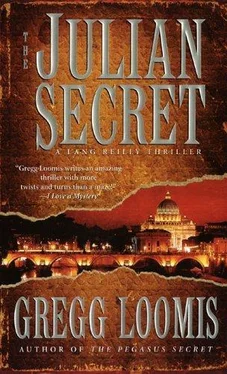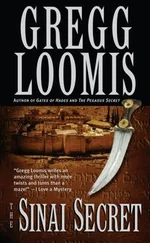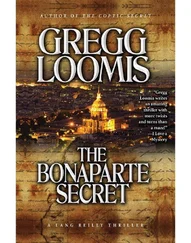Gregg Loomis - The Julian secret
Здесь есть возможность читать онлайн «Gregg Loomis - The Julian secret» весь текст электронной книги совершенно бесплатно (целиком полную версию без сокращений). В некоторых случаях можно слушать аудио, скачать через торрент в формате fb2 и присутствует краткое содержание. Жанр: Триллер, на английском языке. Описание произведения, (предисловие) а так же отзывы посетителей доступны на портале библиотеки ЛибКат.
- Название:The Julian secret
- Автор:
- Жанр:
- Год:неизвестен
- ISBN:нет данных
- Рейтинг книги:4 / 5. Голосов: 1
-
Избранное:Добавить в избранное
- Отзывы:
-
Ваша оценка:
- 80
- 1
- 2
- 3
- 4
- 5
The Julian secret: краткое содержание, описание и аннотация
Предлагаем к чтению аннотацию, описание, краткое содержание или предисловие (зависит от того, что написал сам автор книги «The Julian secret»). Если вы не нашли необходимую информацию о книге — напишите в комментариях, мы постараемся отыскать её.
The Julian secret — читать онлайн бесплатно полную книгу (весь текст) целиком
Ниже представлен текст книги, разбитый по страницам. Система сохранения места последней прочитанной страницы, позволяет с удобством читать онлайн бесплатно книгу «The Julian secret», без необходимости каждый раз заново искать на чём Вы остановились. Поставьте закладку, и сможете в любой момент перейти на страницу, на которой закончили чтение.
Интервал:
Закладка:
"OSS," Lang suggested.
"The Oss and its successor slipped a number of Nazis out of Germany, those they thought might be helpful in spying or revealing Russian spies. There was even a name for the operation-Operation Paper Clip."
The sheer banality made Lang smile for a second. "And you think it is these old Nazis who don't want the information Don had to get out?"
"It cannot be," Gurt interjected. "Whoever they were, eighty or ninety would be their age now. Don Huff was not over run by a wheelchair or clubbed with a crutch."
Blucher took a long sip from his cup and set it back down. "There was such an organization, Die Spinne, the spider, that aided escapes from Germany. People like Bormann, Hitler's personal secretary, and Mengele, who conducted medical experiments on live inmates of the camps. Many also escaped on Vatican passports."
Lang glanced at Gurt, remembering her reference to the same organization. "But you don't think…?"
"I don't think some Nazi organization killed your friend, no. As Fraulein Fuchs says, the old men are either dead or nearly so. There is perhaps other information your friend was about to reveal, perhaps without even knowing it."
Not much help, Lang thought. "What about you, what's your connection to all this? I mean, I know what you said about your father, but how did you and Don hook up?"
Blucher slumped as though someone had placed a weight on his shoulders. He stared straight ahead. "After the war, I finished school, went to university right here in Heidelberg. I became interested in history and got a doctorate in it." He smiled sadly. "I almost didn't receive my degree. I wrote my dissertation on the war criminals who escaped justice, not exactly a popular subject. In fact, I think had the administration not feared the world would learn they had in essence censored such a work, they would not have awarded my Ph. D." He turned to give Lang a painful look. "The Germans have national amnesia where the war is concerned. It is not a popular subject, nor was I a popular professor. Fortunately, I was invited to teach at Cambridge in England, where I spent the rest of my academic career.
"By the time I retired, most of the faculty and all of the students I had known here were gone. My wife died a year after our return, and I feared I was to die of boredom. Then, somehow, your friend found a copy of my dissertation. He called and asked if I was interested in helping with his book. I was tired of gardening and the other activities of the old, so I agreed. We e-mailed each other and talked on the phone almost every day. Every day until… until he was killed."
All three were quiet, their coffee getting -cold as each thought.
Lang stood. "I've got some pictures I'd like you to see." He went to the bedroom and returned with a number of prints. "I had these made from a CD that Dan's killer didn't get. Take a look and see if you recognize anyone."
Blucher produced the glasses again, placing them firmly on his nose and deliberately hooking the frame around his ears. Through the lenses, Lang could see his eyes widen. "Skorzeny!"
"Who?"
"The man Jessica said her father was writing of,"
Gurt reminded him. "Otto Skorzeny."
Blucher held the picture up, the one of the man in uniform standing in front of the Vatican. "That's him, Otto Skorzeny."
Lang settled back into his chair. "Tell us about him."
Blucher put the picture down and unhooked the spectacles from his ears before he spoke. ''Austrian, college educated, got that scar in a Schmisse, student duel. Passionately pro-Hitler, SS, sometimes called Hitler's commando. He was the one who flew gliders onto a mountaintop to rescue Mussolini without a shot being fired. Organized the parachute drop onto Cypress that took the British completely by surprise. It was Skorzeny that Hitler sent to Montsegur…"
"Where?" Lang asked, the word faintly familiar. "The place in the Languedoc in France. It was on one of Don's cards, too," Gurt said. Lang had the feeling he was getting somewhere, but he had no idea where. "Excuse me. Please continue." Blucher nodded. "Montsegur. It was the last holdout of the Cathars, a here… here…"
"Heretical sect," Lang said, remembering his adventure in the region last year with something less than fondness.
''Yes, heretics," the professor continued. "They were victims of one of the Crusades declared by the Pope in the early thirteenth century. Slaughtered to a man. Question was, what was their heresy? Were they like the Gnostics, who believed Christ rose from the dead spiritually rather than in body? Or was their problem that they had something the Pope wanted or did not want known? With Hitler's obsession with things of a supernatural nature-he was continually searching for the Holy Grail, for instance-he sent Skorzeny to the remnants of the old fortress and cave-"
"Cave?" Lang asked, instantly annoyed with himself for interrupting. He wasn't the only one. Gurt produced and lit a cigarette in retaliation.
"Yes, a cave." The old man held up another photo, this one showing Skorzeny in lederhosen. "This one may have been taken there. See the wall behind him with what could be carving on it? Odd. Skorzeny did not allow himself to be photographed very often. Avery secretive man. Almost as though he knew he would be one of the people the Allies would come looking for."
"Why?" Lang wanted to know. "He sounds more like a hero than a criminal."
"I suppose the line can be, er, slender," Blucher said. "In 1944, Hitler sent Skorzeny to seize the Citadel of Budapest. The Russians were preparing to invade Hungary, and the Hungarians had been allies of the Germans. Now they wanted to make a separate peace. Hitler couldn't have a Russian ally on his doorstep, so he sent Skorzeny to capture Admiral Miklos Horthy, Hungary's leader, and the whole Hungarian cabinet. With Just a few 55 troops, Skorzeny overthrew the legitimate government of the country, replacing it with a puppet one."
"Impressive," Lang said, thinking of too many similarities. The old switch-governments trick had been pulled off more than once by his former employers. "But criminal in the context of war?"
"Perhaps, perhaps not," the professor conceded. "In December of 1944 in the Ardennes-the Bulge, I think you Americans called the battle-Skorzeny rounded up several hundred idiomatic-American-speaking Germans, dressed them in U.S. army uniforms, and infiltrated American lines."
"They would have been shot as spies," Lang said.
"But hardly criminal."
The professor smiled weakly. "You would have been right had not Skorzeny's men taken over a hundred prisoners, bound them, and shot them in the back, a crime even greater than the theft of every bit of art or treasure he found in Hungary."
"So," Lang wanted to know, "why wasn't he tried for that?" The old man gave a shrug. "After the war, he disappeared, simply ceased to exist. A few years later, he resurfaced in Spain, under Franco's protection, helped reorganize his army."
Lang got up to look over the professor's shoulder. Once again he had a feeling of deja vu, a sense of having seen that face before the photographs. "If the Allies knew he was there, why not force Franco to give him up? I'm sure we had extradition treaties with Spain."
Blucher grinned slightly. ''You speak like a lawyer."
"I am a lawyer."
The old man gave Gurt a wink. "I am lost. I have entrusted myself to a lawyer."
Lawyer-bashing, now an international sport.
Blucher stood. "Why Skorzeny was not taken from Spain is a good question, Herr Reilly. I have some material at home you will find most interesting. It is getting late. Perhaps we can still meet at the castle tomorrow? I'll bring it then."
"Why not just meet here again?" Gurt asked. "This suite is more secure than the ruins of a castle."
Читать дальшеИнтервал:
Закладка:
Похожие книги на «The Julian secret»
Представляем Вашему вниманию похожие книги на «The Julian secret» списком для выбора. Мы отобрали схожую по названию и смыслу литературу в надежде предоставить читателям больше вариантов отыскать новые, интересные, ещё непрочитанные произведения.
Обсуждение, отзывы о книге «The Julian secret» и просто собственные мнения читателей. Оставьте ваши комментарии, напишите, что Вы думаете о произведении, его смысле или главных героях. Укажите что конкретно понравилось, а что нет, и почему Вы так считаете.












